Viktor Zamiatin, director of political and legal programmes of Razumkov Centre
Vasyl Yurchyshyn, director of economic programmes of Razumkov Centre
Now, at the start of 2024, Ukraine faces new challenges related with the prospects of its successful fight with the Russian aggressor. On the one hand, thanks to the partner support of democratic countries, Ukraine has proven its civilizational capacity, established itself as a freedom-loving country, and should multiply efforts to build and strengthen a democratic society and join the European community.
On the other hand, the current political tension in the USA, formally caused by the Federal budget controversy in the context of support for Ukraine, bears enhanced risks regarding the ability of developed countries to provide Ukraine with the appropriate resources for defence and victory on a permanent basis ("as much as it will need"). It is clear that political passions in the USA during the year at times can cause complications or imbalances in political, economic, humanitarian and military aid to Ukraine (which Russia will try to take full advantage of). The culmination of this tension will come at the year end, during the presidential elections in the USA, with the election campaign and its outcome exerting a significant impact on the further course of the war in Ukraine and other events in Europe.
Therefore, the positive signals that have been coming from European countries since the beginning of the year should be welcomed and properly evaluated by both the institutes of power and civil society. First of all, it is about speeding up the start of negotiations on Ukraine's accession to the EU, gradual implementation of the initiative of providing certain security guarantees to Ukraine before its accession to NATO (where Great Britain became the first country to sign such an agreement with Ukraine), the steps of Denmark, Norway and the Netherlands providing combat aircraft. Equally important is German Chancellor Scholz's pledge to allocate more than €7 billion in military aid to Ukraine this year. In total, Germany is to spend €8 billion on arms and financial aid for Ukraine this year, another €6 billion are to be spent to help Ukrainian refugees. As far as we know, Berlin originally planned to allocate about €4 billion in military aid to Ukraine.
At the same time, Scholz more than once noted that Germany provided Ukraine with the largest aid among the European Union countries, and called on other EU member states to increase their aid. According to him, Germany's share makes more than half of the total EU aid to Ukraine. All in all, as of October 31 last year, Germany's commitments exceeded €17 billion, roughly five times the contribution of Denmark, the second largest contributor of military aid.
This change in rhetoric, as well as the decision reached last October to create a joint venture in Ukraine with the Rheinmetall company, the leading German manufacturer of military equipment, allow us to cautiously assume that Germany is gradually beginning to understand the connection between the prospects of the war in Ukraine and the security of the whole of Europe
Scholz's rhetoric, like that of other German leaders, remains rather cautious, the real actions and decisions of Berlin as one of the "engines" of the European machine are still far from fully meeting the real present-day needs of the Ukrainian military, moreover the future of the united Europe. However, these are the first practical steps towards the formulation of a new "Eastern policy" in Germany — a country that has traditionally set the tone in the European integration.
Probably, by doing so, Scholz and Germany make a claim to renew and strengthen Berlin's role in the world politics. After all, it is no secret that Germany's authority declined in the late 2010s, and the crisis pressure of the coronavirus in 2020 and inflation in 2022 began to compromise its leadership in Europe.
Now, at the beginning of 2024, there is no talk of a full-scale recovery of European economies, but there are reasons to suggest that the crisis in the European Union is over. For Ukraine, this is important both in terms of economic recovery (primarily due to the growing demand for Ukrainian products) and the increase in the amount of aid that EU countries provide to Ukraine as partner support.
Controversies of support. First of all, it should be noted that the relations between Ukraine and the EU were not straightforward. In particular, the European Union, and first of all its leading countries, such as Germany and France, flatly refused to recognize the European perspective of Ukraine or to support the intentions of its leaders (V. Yushchenko, P. Poroshenko) to bring the country closer to NATO. The obstacles included the slow progress of reforms in Ukraine, rampant corruption, and a non-public but obvious desire to maintain close relations with Russia, thus recognizing its right to influence the developments in Ukraine.
That is why the European Union, declaratively supporting reforms and even providing certain credit resources (which, on the one hand, were supposed to demonstrate the interest of democratic Europe in the development of the new country and its economy, but on the other, could not significantly influence the nature of post-socialist transformations), in reality did nothing to protect our country from its clearly aggressive neighbour. This is true not only for Ukraine.
This became especially evident in 2008, when the West openly ignored the Russian aggression against Georgia and refused (under the influence of the then leaders of Germany and France) to approve the NATO membership action plan for Ukraine. The following years, and above all the beginning of Russian aggression against Ukraine in 2014, proved the fallacy of the German and French policy of appeasement towards Russia, but radical changes in these approaches did not occur until Ukraine proved its ability to resist in 2022. In this context, it is worth mentioning that even during the aggression of 2014, France planned to sell warships to Russia, and only under pressure from Ukrainian and other societies, it cancelled such a deal.
As far as Ukraine is concerned, the EU continued to insist on political and economic reforms in Ukraine and even took steps aimed at deepening relations (in line with the Association Agreement and the Deep and Comprehensive Free Trade Agreement), but at the same time, the signing of the Association Agreement was delayed for too long, and the document did not mention the possibility of Ukraine joining the EU in the future.
On the other hand, despite the declaration of the first sanctions on Russia, the level of relations between the EU and Russia at least did not decrease, and even increased in the energy sector. It is suffice to mention that Germany in all ways contributed to the development and commissioning of the "Nord Streams", which were designed to replace the "Ukrainian" transit route of energy carriers to European countries, and flatly refused to recognize any other role of those gas pipelines, but for business.
Even after 2014, Germany insisted that Russia should not be provoked into further escalation, and Chancellor Merkel mediated in the signing of the so-called "Minsk Agreements", extremely humiliating for Ukraine. At that time, German Foreign Minister Steinmeier, in a joint letter with his French counterpart Fabius to the foreign ministers of Ukraine and Russia, suggested holding elections in the occupied part of Donbas, not expecting its de-occupation ("Steinmeier's formula").
In general, the policy of the leading EU countries, primarily Germany, in 2014–2022 was focused on maintaining the status quo in relations with Russia, which partly lost its political authority but remained an important economic partner (due to their mutually beneficial business).
It should be noted that the logic of European political processes in 2022–2023 changed significantly. One of the reasons for this was the all-too-obvious violation by Moscow of all existing agreements and the invasion of Ukraine on February 24, 2022, which Chancellor Scholz, in particular, spoke about more than once.
However, attempts "not to irritate the Russian bear" continued even after the start of the full-scale Russian aggression against Ukraine on February 24, 2022. Neither the United States nor its European allies believed in Ukraine's resilience, and therefore refused to provide it with weapons to repel the aggression. Noteworthy, at the beginning of the Russian invasion Germany led the G7 and therefore, expressed a common position of the world's leading states at that time.
We remember how Berlin was torpedoing the supply of Leopard tanks to Ukraine, each time — with different reasons behind the refusal. However, at the beginning of 2023, the situation began to gradually change. With the formation of the "tank coalition", Leopard tanks did reach Ukraine, took part in battles, and in Poland, facilities were created for their repair and recommissioning. By the way, the Rheinmetall plant in Ukraine will primarily focus on the maintenance and repair of the military equipment already provided by Germany.
German investments in the fighting potential of the Armed Forces of Ukraine in 2023 totalled €5.4 billion (in 2022 — €2 billion), and the authorized commitments for the following years — €10.5 billion. These funds will mainly be used for military support to Ukraine, and also to finance the replenishment of the Bundeswehr’s materiel transferred to Ukraine from its stocks and Germany's contributions to the European Peace Facility (EPF), intended to cover the EU member states’ expenditures to support Ukraine.
Such facts are well known to Ukrainians, who are aware of and appreciate such support. According to the July 2023 public opinion poll by Razumkov Center, 87.9% of respondents saw Germany as a strategic partner of Ukraine. During the August poll, 86.2% of Ukrainians reported a positive attitude to Germany. Therefore, it is important to clarify the situation with the possible further support for Ukraine from a leading European country.
According to the media reports, during the Ramstein meeting in January 2024, it was agreed that this year Germany would deliver to Ukraine, in particular, 9 IRIS-T SLM air defence systems, Gepard self-propelled anti-aircraft guns, SKYNEX air defence systems, 105 Leopard 1A5 tanks, 30 Marder IFVs, 15 GEPARD anti-aircraft tanks and more than 250,000 shells for them, 12 Biber bridge-layers, more than 250,000 155-mm shells. In April-June, the Bundeswehr will also transfer six Sea King Mk 41 utility helicopters (quite old aircraft fit for transport and rescue operations). In addition, the Bundeswehr plans to train 10,000 Ukrainian soldiers in 2024. For better delivery of projectiles to Ukraine, Rheinmetall will build a new plant.
At the same time, the Scholz government now persistently refuses to provide Ukraine with Taurus long-range missiles, but it does not mean that the supply of these missiles will never happen. Berlin also insists that Ukraine should not use the weapons provided by the West to targets the Russian territory.
Although the German government is very careful in its words in support for Ukraine's European and Euro-Atlantic integration, at least today Berlin expresses support for these processes, provided that Ukraine meets all the necessary criteria. We still do not hear from Chancellor Scholz and members of his cabinet that Ukraine must win this war, but the words of supporting it as much as it is necessary are heard often.
As we can see, almost two years into the war, Germany's political stand regarding Ukraine has changed from long-term ignoring, denial of the very possibility of its return to the European civilization, to at least recognition of such a right for it and cautious support, from the refusal of Scholz’s fellow party members, social democrats, and the German centre right to provide Ukraine with weapons for defence to the gradual supply of air defence systems, tanks, and now — helicopters.
Scholz's hesitance in supporting Ukraine with weapons has been criticised by the centre-right opposition CDU/CSU bloc, while arms deliveries to Ukraine were condemned by parties that openly support Russia: the Alternative for Germany (AfD), the left, and now also the new party of Sahra Wagenknecht.
Internal challenges. As we noted, the actions of the Sholtz government in matters of support for Ukraine are repeatedly criticized from both the right and the left. This does not mean, of course, that the CDU/CSU can fundamentally change the situation as soon as it comes to power, or the support for Ukraine can radically change after the next elections (this year — to the European Parliament, next year — to the Bundestag).
Polls show that German society no longer tends to support the traditional political alliances of the recent past (the centre-left Social Democrats and the Greens, or the centre-right CDU/CSU with the liberal Free Democrats). The next Bundestag will obviously be even more fragmented than it is now. Scholz's Social Democrats are gradually losing voter support (currently, 14%, according to the INSA poll), their coalition partners — the Greens — have 13%, Free Democrats — 4%. The opposition centre right are supported by 31%.
Meanwhile, the anti-immigration and actually pro-Putin, in its rhetoric, AfD already has 21% of voter support, and the newly formed left-wing Sahra Wagenknecht's party Union for Common Sense and Justice (Bündnis Sahra Wagenknecht — Für Vernunft und Gerechtigkeit), which also stands against support for Ukraine and for friendship with Moscow, gained 7% from the start.
When asked about building up support for Ukraine with weapons, as evidenced by polls, slightly more than half of Germans support such an approach (51%), while 42% oppose it. If the far-right and far-left can convince the voters that economic troubles, their own and of the country, are connected with the support for Ukraine, then the current policy will become unpopular, and Germany can expect political upheavals. Scholz hardly wants his tenure to end like that.
Hence, the caution of the Chancellor and his government is caused both by the fear of the escalation of the war, and by purely internal factors. However, the very recognition of the fact that even Germany, with all its economic strength and international prestige, will not be able to simply wait out the current war, can improve the chances for the Social Democrats to at least participate in the new government, and give the country an impetus to regain leadership in the European Union. This, of course, requires effort.
In its turn, the Ukrainian leadership will have to demonstrate that the country is worth not just of support, but of real partnership on the part of Germany, and that it is in Germany's interests to make this partnership as close and efficient as possible.
Geoeconomic shifts. The 2020s, which began with the global coronavirus and continued with the Russian aggression and Hamas attack on Israel, witnessed significant changes in the world political and economic system. First of all, it should be noted that the leading developed countries that in the previous half century served as models of socio-economic development, noticeably lost economic steam in recent years. This is especially true for the EU that faced a series of internal and external crises in the mid-2010s, creating perhaps the biggest challenges for the EU's ability to withstand authoritarian pressure and preserve human and democratic values.
It should be noted that globalization in previous decades vacated the economic capacity of many countries, which resulted in an unprecedented increase in incomes and well-being. Against this background of economic prosperity (which over time became taken for granted, as the highest value), democratic values can recede from public view. Unfortunately, practice confirms this: the European Union has not coped with all the challenges properly.
A series of "small" crisis waves (such as the migration and debt crises of the 2010s in Europe, not global in scale but quite sensitive even for developed countries) prompted countries not only to build more barriers for protection of their businesses from global competitive pressure but also for ruling out their sliding into crisis processes in partner countries. However, this inevitably led to a decrease in economic openness, and thus, to the deterioration of living standards even in developed economies. And it turned out that even the established global financial institutions, which were seen as a tool of promoting economic development, appeared incapable of building fair global economic relations.
Noteworthy, after the Global Financial Crisis of 2008-2009, the world GDP and exports (trade) growth rates almost equalled, i.e. the importance of the world trade for the overall economic dynamics notably declined (while the importance of internal factors increased) (Chart "World economy and exports growth rates").
Indeed, in recent years, economic growth slowed down in all parts of the world, which was complicated by intentions and actions aimed at separation from the rest of the world or isolation with a number of partner countries. Germany, which professed and still professes the ideology of economic openness, felt the negative impact of such processes, which became a significant factor of retardation of socio-economic dynamics.
World economy and exports growth rates, % per annum
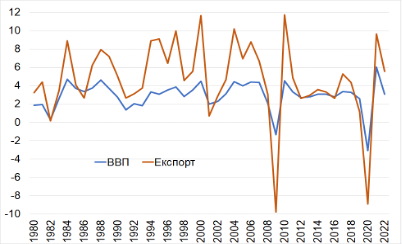
It also turned out that the competitiveness of many countries and companies, in the conditions of growing restrictions (in resources and logistics), is no longer as strong as it was believed. This was especially clearly manifested in industrial production, in particular, in Germany, whose industry during the past 50 years had competitive advantages largely due to the (politically motivated) preferential cost of Russian energy resources. Let us look at the signs of the weakening of economic dynamics in Germany in recent years.
Economic weakening of Germany. The German economy, as before, remains the third largest in terms of GDP. However, crisis shocks caused by Russian aggression (high inflation, imbalances in the world energy and food markets, forced migration) led to a significant weakening and even deterioration of economic dynamics. The growth of the German economy, too, was almost the lowest among the developed countries (Table "Comparison of economic growth forecasts...").
Comparison of economic growth forecasts at the beginning of 2023 and preliminary results of 2023, % compared to the previous year
|
IMF assessment and forecast, April 2023 |
IMF forecast, October 2023 |
||||
|
2021 fact |
2022 assessment |
2023 forecast |
2022 fact |
2023 forecast |
|
|
World economy |
6,2 |
3,4 |
2,9 |
3,5 |
3,0 |
|
Developed countries |
5,4 |
2,7 |
1,2 |
2,6 |
1,5 |
|
Germany |
2,6 |
1,9 |
0,1 |
1,8 |
-0,5 |
Moreover, Germany began to lag behind, economically, from its closest economic and political competitor — France, which looks especially sad for many German businesses and households. First of all, in recent years, economic growth rates in France significantly exceeded such rates in Germany (Chart "Real GDP growth in Germany and France").
Real GDP growth in Germany and France, % compared to the previous year
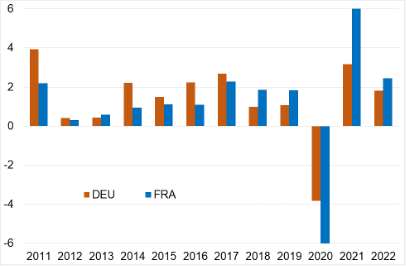
Secondly, the share of investments in the German GDP structure is significantly lower than the investment level in the French economy (Chart "Gross capital formation"), which reduces the production potential of the national business, and also weakens the incentives for the inflow of foreign capital. So far, the German economy has a fairly strong industrial base — generation of added value in industry and construction is quite stable at a level of 27–28% of the total added value in the country. However, it was like that in the conditions of openness and easy access to energy resources. Their deficit can obviously significantly change the place of industry in the structure of the German economy.
Gross capital formation, % of GDP
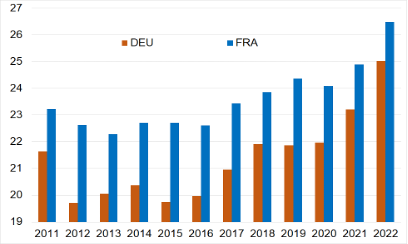
It should be noted that certain neglect of (economic) security issues in previous decades, especially in the Chinese expansion, now prompts the European Union to rapidly use the tools of "hard" security and collective protection of its economic interests. But this requires much deeper political integration and working mechanisms for efficient solutions (resolutions by consensus deteriorate the speed and quality of comprehensive anti-crisis measures). Therefore, a vicious circle is formed: limitation of economic openness and weakening of incentives for capital formation reinforce each other.
Thirdly, productivity in Germany is noticeably lower than in France (Chart "Productivity of the German and French economies"). Although the coronavirus crisis has "evened out" productivity indices, the trends seem to be long-term in their nature.
Productivity of the German and French economies, GDP per employee (constant 2017 $PPP)
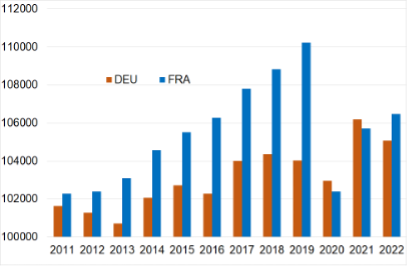
Fourthly, although Germany's export capacity remains high (the share of exports of goods and services in GDP remains stable at a level of 45–50%, which is much higher than in the French GDP structure) (Chart "Export share in the GDP of Germany and France"), the "quality" aspect of exports is noticeably worse. And in recent years, both countries have demonstrated technological deterioration of exports (Chart "High-tech exports of Germany and France").
Despite significant crisis losses, including caused by the Russian aggression against Ukraine, Germany showed signs of recovery in the second quarter of 2023 (Charts "Indices of economic activity in Germany"). However, expert assessments are reserved. Note that (1) although activity in the processing industries is increasing, it remains low, (2) assessments of the business climate are practically unchanged, and (3) new orders do not show signs of recovery in production needs.
Along with this, stock market indices give more optimistic signals of business activity. The indices of the leading German stock market (DAX 40) and the euro zone (EU 50) in December-January are stable high (Chart "Stock indices"), which gives reason to expect better rates of economic development of European countries than is was predicted in the fall.
Export share in the GDP of Germany and France, %
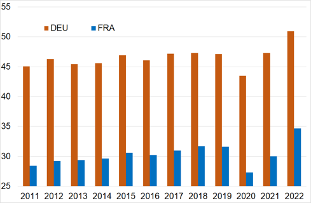
High-tech exports of Germany and France, % of total exports
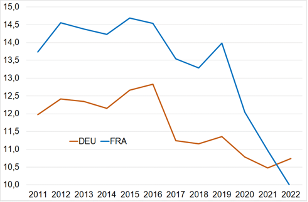
Indices of economic activity in Germany
Activity in processing industries
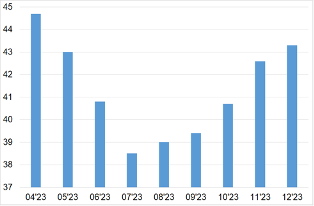
Business climate
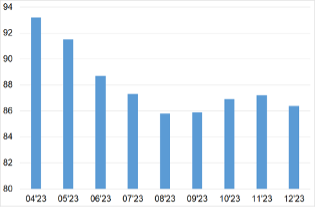
Economic sentiments
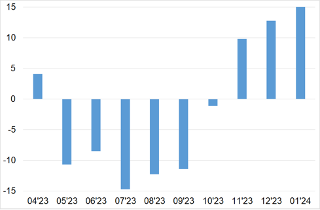
New orders
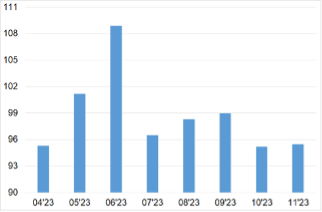
The expected recovery, if the current signals really reflect the trends in the real sector of the economy, will also mean a new path for Germany to European leadership, presuming the country’s claim of the status of a major military power. We can judge about the real progress of the country in the security sector by it spending 2% of GDP on security and defence, which will simultaneously remove discontent of the US, which demands defence expenditures of all NATO member states at this level.
Stock indices
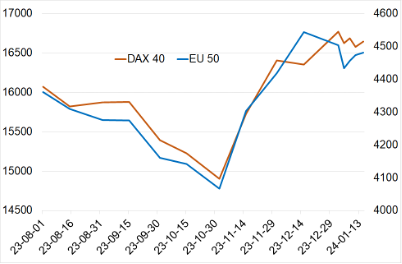
Strategically, this will fully fit into the task of restoring the German security policy in Europe (Zeitenwende — "a historic turn") and will be a big step forward towards a new reality. In this way Germany will fulfil its role as the centre of gravity for the new European security policy. With NATO expansion and increased spending on security and defence by all European member states, Germany will be able to modify relations, especially with the countries of Central and Eastern Europe, the Baltics, and Northern Europe. This means not only the creation of an integrated security system but also joint production lines for weapons and ammunition. It is clear that Ukraine's experience in countering the aggressor, including testing and application of new types of weapons on the battlefield, will be of exceptional importance for the industry development in general.
Implications for Ukraine. Accelerated development of the German economy will be a consolidating factor strengthening the European security, and will have exceptional importance for the sustainability of the German policy of support for Ukraine. It is no surprise that a country's willingness to provide economic assistance to a partner state (in times of need) largely depends on the availability of resources that can be shared. It is clear that the volume of such "additional" resources grows with the growth of production and productivity in the donor country. Let us note two things.
(1). Germany, as we said, is ready to significantly step up aid to Ukraine from the beginning of 2024. Therefore, economic recovery in Germany can also mean more resources that the country can "share", primarily security and military resources.
Today we don’t even mention that Germany avoided providing weapons to Ukraine for a long time, even when it itself warned Kyiv about Russia's preparations for a large war. Now we are talking about full-scale (including defence and security) assistance to Ukraine. Although Germany still "looks" at the United States in terms of supplying offensive weapons, if the United States delays practical provision of aid to Ukraine, Germany will undoubtedly take the lead.
(2). Last year, Germany, where hundreds of thousands of Ukrainians found refuge, spent more than €11 billion to help Ukrainian refugees. It is already clear that many of the present forced Ukrainian emigrants will remain in Germany for years (or even forever). However, recession, downturn and drain of production capacities may undermine both the ability of the German government to continue social support for Ukrainians and the chances to find work for those Ukrainians who are ready to earn for themselves (and their families) with their labour.
At the same time, accelerated development of the German economy, strengthening of the country's leadership in Europe may become a guiding light for the economic and security development of Ukraine.
In conclusion, we wish to emphasize once again that it is important for Ukraine that the world democratic community realizes that military and civilian aid to Ukraine will be more efficient if it is seen by governments and civil societies in partner countries not only as a matter of international humanitarian solidarity but as a challenge and necessity of their national security. Current support for Ukraine means strengthening the security of partner countries (primarily European) now and in the future, a significant component of it being the victory of Ukraine and the revival of Ukraine as a democratic European country.
On the other hand, Ukraine can well be a platform for investing in a variety of industries. Of course, provided that the investments are protected in every sense. So, the experience of Rheinmetall will be invaluable for the European future of Ukraine.
https://razumkov.org.ua/statti/nimechchyna-na-shliakhu-do-vidnovlennia-liderstva




